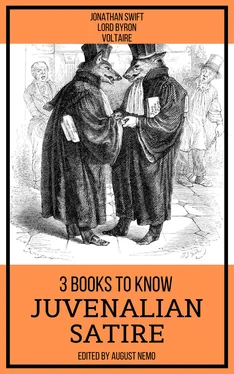Discoveries made, but none could be aware
Of this, at least no symptom e'er was shown;
Perhaps she did not know, or did not care,
Indifferent from the first or callous grown:
I 'm really puzzled what to think or say,
She kept her counsel in so close a way.
Juan she saw, and, as a pretty child,
Caress'd him often—such a thing might be
Quite innocently done, and harmless styled,
When she had twenty years, and thirteen he;
But I am not so sure I should have smiled
When he was sixteen, Julia twenty-three;
These few short years make wondrous alterations,
Particularly amongst sun-burnt nations.
Whate'er the cause might be, they had become
Changed; for the dame grew distant, the youth shy,
Their looks cast down, their greetings almost dumb,
And much embarrassment in either eye;
There surely will be little doubt with some
That Donna Julia knew the reason why,
But as for Juan, he had no more notion
Than he who never saw the sea of ocean.
Yet Julia's very coldness still was kind,
And tremulously gentle her small hand
Withdrew itself from his, but left behind
A little pressure, thrilling, and so bland
And slight, so very slight, that to the mind
'T was but a doubt; but ne'er magician's wand
Wrought change with all Armida's fairy art
Like what this light touch left on Juan's heart.
And if she met him, though she smiled no more,
She look'd a sadness sweeter than her smile,
As if her heart had deeper thoughts in store
She must not own, but cherish'd more the while
For that compression in its burning core;
Even innocence itself has many a wile,
And will not dare to trust itself with truth,
And love is taught hypocrisy from youth.
But passion most dissembles, yet betrays
Even by its darkness; as the blackest sky
Foretells the heaviest tempest, it displays
Its workings through the vainly guarded eye,
And in whatever aspect it arrays
Itself, 't is still the same hypocrisy;
Coldness or anger, even disdain or hate,
Are masks it often wears, and still too late.
Then there were sighs, the deeper for suppression,
And stolen glances, sweeter for the theft,
And burning blushes, though for no transgression,
Tremblings when met, and restlessness when left;
All these are little preludes to possession,
Of which young passion cannot be bereft,
And merely tend to show how greatly love is
Embarrass'd at first starting with a novice.
Poor Julia's heart was in an awkward state;
She felt it going, and resolved to make
The noblest efforts for herself and mate,
For honour's, pride's, religion's, virtue's sake;
Her resolutions were most truly great,
And almost might have made a Tarquin quake:
She pray'd the Virgin Mary for her grace,
As being the best judge of a lady's case.
She vow'd she never would see Juan more,
And next day paid a visit to his mother,
And look'd extremely at the opening door,
Which, by the Virgin's grace, let in another;
Grateful she was, and yet a little sore—
Again it opens, it can be no other,
'T is surely Juan now—No! I 'm afraid
That night the Virgin was no further pray'd.
She now determined that a virtuous woman
Should rather face and overcome temptation,
That flight was base and dastardly, and no man
Should ever give her heart the least sensation;
That is to say, a thought beyond the common
Preference, that we must feel upon occasion
For people who are pleasanter than others,
But then they only seem so many brothers.
And even if by chance—and who can tell?
The devil 's so very sly—she should discover
That all within was not so very well,
And, if still free, that such or such a lover
Might please perhaps, a virtuous wife can quell
Such thoughts, and be the better when they 're over;
And if the man should ask, 't is but denial:
I recommend young ladies to make trial.
And then there are such things as love divine,
Bright and immaculate, unmix'd and pure,
Such as the angels think so very fine,
And matrons who would be no less secure,
Platonic, perfect, 'just such love as mine;'
Thus Julia said—and thought so, to be sure;
And so I 'd have her think, were I the man
On whom her reveries celestial ran.
Such love is innocent, and may exist
Between young persons without any danger.
A hand may first, and then a lip be kist;
For my part, to such doings I 'm a stranger,
But hear these freedoms form the utmost list
Of all o'er which such love may be a ranger:
If people go beyond, 't is quite a crime,
But not my fault—I tell them all in time.
Love, then, but love within its proper limits,
Was Julia's innocent determination
In young Don Juan's favour, and to him its
Exertion might be useful on occasion;
And, lighted at too pure a shrine to dim its
Ethereal lustre, with what sweet persuasion
He might be taught, by love and her together—
I really don't know what, nor Julia either.
Fraught with this fine intention, and well fenced
In mail of proof—her purity of soul—
She, for the future of her strength convinced.
And that her honour was a rock, or mole,
Exceeding sagely from that hour dispensed
With any kind of troublesome control;
But whether Julia to the task was equal
Is that which must be mention'd in the sequel.
Her plan she deem'd both innocent and feasible,
And, surely, with a stripling of sixteen
Not scandal's fangs could fix on much that 's seizable,
Or if they did so, satisfied to mean
Nothing but what was good, her breast was peaceable—
A quiet conscience makes one so serene!
Christians have burnt each other, quite persuaded
That all the Apostles would have done as they did.
And if in the mean time her husband died,
But Heaven forbid that such a thought should cross
Her brain, though in a dream! (and then she sigh'd)
Never could she survive that common loss;
But just suppose that moment should betide,
I only say suppose it—inter nos.
(This should be entre nous, for Julia thought
In French, but then the rhyme would go for naught.)
I only say suppose this supposition:
Juan being then grown up to man's estate
Would fully suit a widow of condition,
Even seven years hence it would not be too late;
And in the interim (to pursue this vision)
The mischief, after all, could not be great,
For he would learn the rudiments of love,
I mean the seraph way of those above.
So much for Julia. Now we 'll turn to Juan.
Poor little fellow! he had no idea
Of his own case, and never hit the true one;
In feelings quick as Ovid's Miss Medea,
He puzzled over what he found a new one,
But not as yet imagined it could be
Thing quite in course, and not at all alarming,
Which, with a little patience, might grow charming.
Silent and pensive, idle, restless, slow,
His home deserted for the lonely wood,
Tormented with a wound he could not know,
His, like all deep grief, plunged in solitude:
I 'm fond myself of solitude or so,
But then, I beg it may be understood,
By solitude I mean a sultan's, not
A hermit's, with a haram for a grot.
'Oh Love! in such a wilderness as this,
Where transport and security entwine,
Here is the empire of thy perfect bliss,
And here thou art a god indeed divine.'
The bard I quote from does not sing amiss,
Читать дальше












